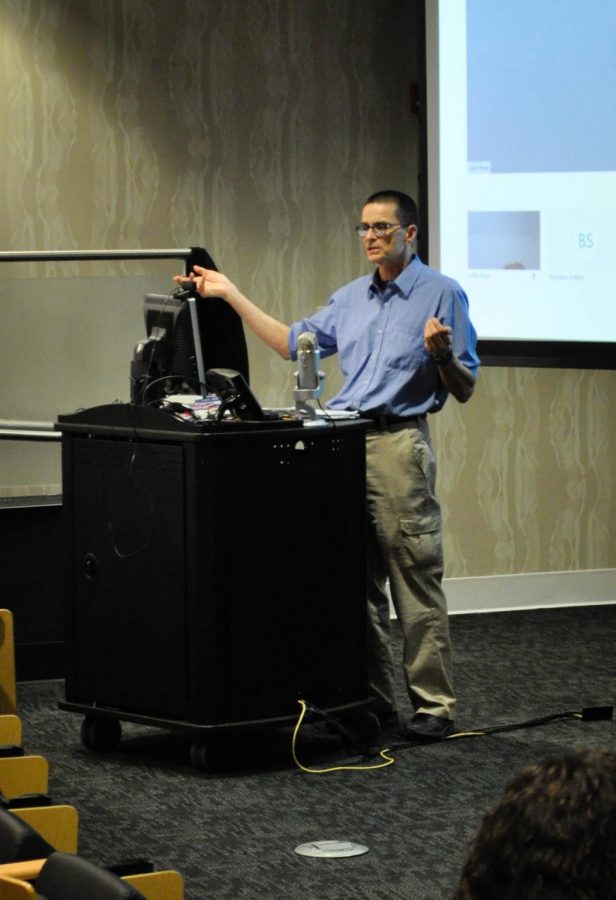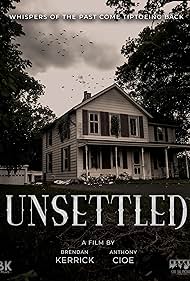‘Is hate speech free?’: Lecture on hate speech debate
Robert Jensen, professor of journalism at the University of Austin at Texas and former journalist speaks on contemporary hate speech on Oct. 13.
Becky Schnoor, junior civil engineering major, came to the lecture “Is Hate Speech Free?” to learn more about hate speech.
“This is a hard topic. It’s interesting that somebody would actually address it,” Schnoor said.
Robert Jensen, professor of journalism at the University of Texas at Austin and former journalist, interpreted the question two ways.
“Are we free to engage in hate speech without potential punishment from an arm of the government, and whether or not we are legally able to engage in it, are costs borne by someone?” Jensen said.
Jensen said free speech is divided into stories society can tell and can’t tell. He explained that the United States suppresses freedom of expression. As a professor at a public university, he can’t engage in inappropriate sex speech, for instance.
“Students can bring a complaint and bring the state down to discipline or fire me, which is the suppression of my free speech,” Jensen said.
“When making decisions on where to draw the line between things we say without fear of punishment and things which may result in punishment, we are balancing. The value of the speech is being weighted on the harm or potential harms.”
He said values of speech should be seen differently because there are different opinions on speech. He applied this to hate speech.
“Reasonable people can disagree on how to assess values on different speech and disagree on how to evaluate the harms or potential harms,” Jensen said. “Like most categories used to explain experience, there is no easy way to define hate speech.”
Jensen said hate speech under the U.S. Supreme Court is free. The ruling of a case involving Asian-American rock band, The Slants, allowed the band to trademark its band name despite it being a slur.
“It may be hateful, but under the current interpretations of the First Amendment, you have to put up with it. People can agree or disagree about it but that is the law,” Jensen said.
Jensen said costs are also associated with hate speech. He said hate speech can offend people, but how offensive it is shouldn’t be the main criteria on judging it. Oppressive hate speech and when it becomes oppressive should be. His distinction between offensiveness and oppression stood out to Schnoor.
“I never thought about oppression and offense as distinctive. I thought of them as the same,” Schnoor said. “When he was talking about ‘this is oppression’ and ‘this is offensiveness,’ it made me understand the depth of it.”
Jensen showed the distinction by discussing the effects of oppressive words.
“Effects based on history, politics, economics, contemporary practices help us understand why words like ‘honky’ and the ‘n-word’ are different words, and you already know they are because I’m not saying the ‘n-word,’” Jensen said.
Jensen said they are different because one has weight of history and has been affected by contemporary practices resulting in racial disparities.
“One is literally connected to the practice of slavery, to the practice of lynching, to the practice of Jim Crow segregation, to the practice of what essentially was a reinstitutionalization of slavery in the 20th century by using convict labor by arbitrarily imprisoning black folks in the south,” Jensen said. “They are the product of a system and the system has a name: white supremacy and it has been operating in the United States long before there were neo-Nazis marching in Charlottesville.”
Jensen said by focusing on offensiveness, social sanctions cannot be placed on hate speech. He left the question in the title of the lecture unanswered because he couldn’t imagine an answer to when hate speech can and cannot be criminalized.
Jensen said although society knows where authoritarian measures to suppress speech leads to, the maximal space for freedom expression is not trivial.
Schnoor said even with no definitive conclusions, she’s glad she learned different views.
“I never thought of these views before,” Schnoor said. “When Jensen was talking about ignorance, I could say ‘Oh, hate speech may not even be there,’ but it is.”



